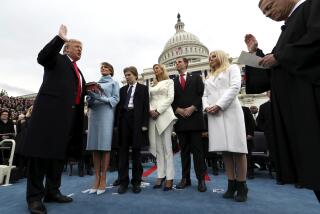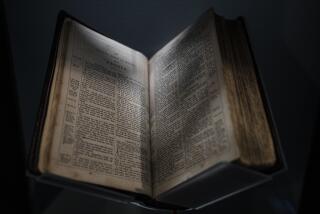Southern Baptists Read Selectively
- Share via
There is a simple and tragic reason why the Southern Baptist Convention at its annual meeting June 12 passed resolutions calling for a boycott of the Walt Disney Co. for providing health benefits to the partners of its gay and lesbian employees, and their less-publicized call for members to intensify their efforts to convert Jews: their literal reading of the Bible--their bibliolotry.
It is this same mistake of putting the Bible before God that has caused the sad schism over the past decade between more moderate Southern Baptists and their fundamentalist co-religionists.
But the ironic fact is that the Baptists are selectively literal in their use of the Bible. Two examples:
In the Gospels of Matthew, Mark and Luke, Jesus unequivocally declares that whoever divorces a spouse and marries another is committing adultery. The only exception is a clause in Matthew’s account, “except for sexual immorality,” (referring principally to adultery). Yet today almost all Christian denominations, except Roman Catholics, permit divorce and remarriage for a number of good reasons: physical abuse, substance abuse, desertion, etc. (Catholics do permit annulments--declarations that a marriage never existed in the first place, an example being a lack of sufficient maturity on the part of one or both spouses.)
How do Baptists justify this discrepancy about divorce? They interpret the Bible, reasoning that if Matthew was aware of one serious reason for permitting an exception to Jesus’ edict, others might exist. This is a reasonable deduction from the text--good biblical scholarship--but is not a literal reading of the Bible.
In both the Hebrew and Christian scriptures, the institution of slavery is at least tolerated. Neither Moses nor any of the Hebrew prophets nor Jesus nor Paul object to the practice (though Paul does try to humanize it by telling slave owners to treat their slaves humanely). Still, the institution itself is tolerated, not protested. In the period before the Civil War, many Southern preachers used the Bible’s tolerance of slavery as a justification for the practice. Some northern Christians, such as Quakers and Mennonites, replied that the teachings of social justice and love of others in both the Jewish and Christian Scriptures undercut slavery.
Once again, good biblical scholarship prevailed. (To their credit, the Southern Baptists recently admitted their mistake in supporting slavery for so long and asked forgiveness of African Americans.)
When it comes to the morality of homosexuality, these literalists rely mainly on two passages from the Hebrew scriptures in the Rock of Leviticus that condemn male homosexuality (though not female) and one in Paul’s Letter to the Romans, which indicts both gays and lesbians. A number of liberal Jewish and Protestant interpreters have pointed to the lack of understanding by the ancients of the physiological and psychological factors that may lead a person to be attracted primarily to someone of the same sex.
Regarding the Baptist resolution calling for stepped-up efforts to convert Jews, the key text is Chapter 14, Verse 6, of the Gospel of John: “I am the way, and the truth, and the life; no one comes to the Father, but by me.” Once again, liberal biblical interpreters have been able to de-absolutize this text by pointing out that it is quite isolated--there are few parallels to it in the New Testament.
I suggest the Baptists concentrate on the millions of nominal Christians in the nation, and that they pass resolutions that speak to real problems in our society: the sad plight of children in inner cities, gay bashing, the high divorce rate, the unwillingness of tobacco companies to take any responsibility for the health problems caused by smoking.
More to Read
Sign up for Essential California
The most important California stories and recommendations in your inbox every morning.
You may occasionally receive promotional content from the Los Angeles Times.










